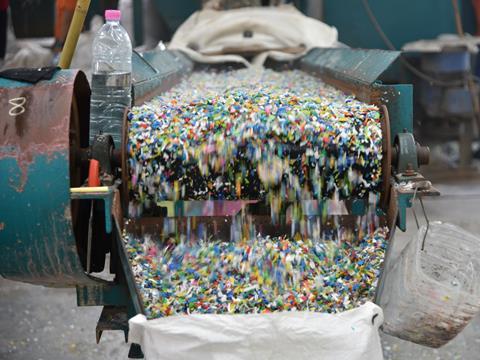
Plastic industry representative PlasticsEurope says it endorses revisions to the EU’s Packaging and Packaging Waste Directive (PPWD), while calling for a new recycled content target of 30% by 2030.
Drawing on the 2018 European Strategy for Plastics, the EU Green Deal, and the Circular Economy Action Plan, the revisions to the Packaging and Packaging Waste Directive (PPWD) aim to establish an economically viable way of reusing or recycling all packaging on the EU market by 2030. PlasticsEurope says that the revisions made to the PPWD are “a key piece of legislation for the transition to a circular economy for plastics”.
The organisation adds that its members support the European Commission’s proposal for a mandatory EU recycled content target for plastics packaging. It is today calling for a specific mandatory target of recycled content in packaging to be 30% by 2030.
According to PlasticsEurope, an enabling policy framework and collaboration with the value chain are key to reaching this 30% target. The group says that recycled content should be derived from all waste materials through a technology-neutral approach that includes both mechanical and chemical recycling, with a credible mass balance framework.
It further claims that its members have planned investments in chemical recycling technology and infrastructure, predicting figures of €2.6 billion by 2025 to €7.2 billion by 2030 in Europe. It also highlights the importance of recognising pre-consumer waste in efforts to reach recycled content targets.
Dr Markus Steilemann, president of PlasticsEurope and CEO of Covestro, states: “The world must embrace the circular economy concept as the key to climate neutrality, resource conservation and environmental protection.
“The call for a regulated recycled content target for plastics packaging in the EU demonstrates our commitment to accelerate the transformation to a circular economy, helping implement the EU Green Deal and Circular Economy Action Plan.”
Virginia Janssens, managing director of PlasticsEurope, comments: “We need a harmonised EU policy framework that provides certainty and incentivises further investment in collection, sorting and recycling infrastructure and technologies, including chemical recycling. We must harness the power of the single market.
“However, systemic change requires concerted collaboration. It is only by working together with the EU institutions and the value chain that we can deliver on this target. With the right enabling conditions in place, this will be a very different industry 10 years from now.”
PlasticsEurope views the European Commission’s Circular Plastics Alliance, in which it is involved, as a key example of the “concerted collaboration that is necessary” to reach circularity goals. The alliance apparently brings together over 290 value chain members striving towards the delivery of 10 million tonnes of recycled content in products by 2025.
This represents the group’s ongoing commitment to circularity in the EU’s plastics value chain. Earlier this year, PlasticsEurope also joined an initiative called PolyREC to record and trace data on recycled materials as its members apparently work towards meeting EU targets on plastics.













